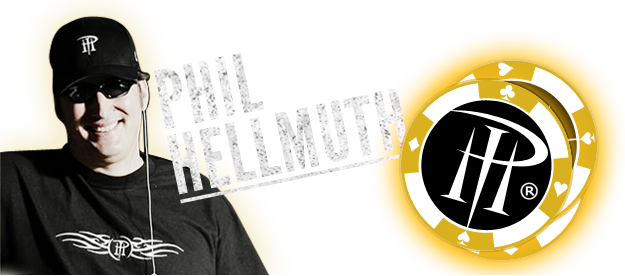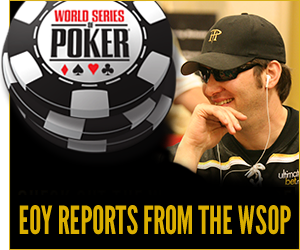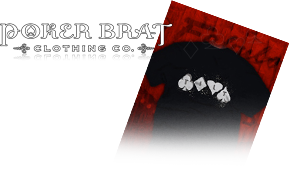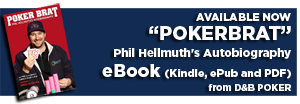-
Keep Making a Stand
In my last column I talked about the importance of making a stand in a no-limit Hold ’em tournament. There are times when you need to say, “I think I have my opponent beat, and now’s the time to make a crucial call or a perfectly timed raise.” I also wrote about a stand I made on Day 3 of the $25,000 buy-in World Poker Tour (WPT) Championship event.
Now let’s fast forward to day four of that event, and another key stand I made. I had just won two big pots in a row, raising my chip stack to $600,000, when I picked up pocket fours, and called the $8,000 bet before the flop. Normally, I would have raised it up with my 4-4, thinking that if I’m going to play a hand, then I’m going to raise it up and give myself a chance to see everyone else fold, allowing me to win the blinds and antes uncontested. By the way, the blinds and antes now added up to $21,000 a hand (big blind of $8,000 plus small blind of $4,000 plus nine $1,000 antes). In this case — because I had raised two pots in a row already — if I did raise it up before the flop, then it was more likely that someone would reraise me, thinking that I was weak, which would force me to fold my 4-4. So I decided merely to call, so that no one would raise me out of the pot.
-
Make a Stand
While playing in the $25,000 buy-in World Poker Tour (WPT) Championship event recently, I chose a key occasion to stand firm. Making a stand is important. There are times when you need to say, “I think I have my opponent beat, and now’s the time to make a crucial call, or a perfectly timed raise.”
On Day 3, I started play with a pathetically low $40,000 in chips, at a time when the average stack in the tournament was more than $200,000. Now, one hour into Day 3, I was up to around $100,000, and feeling good about my improved position. With the blinds at $1,500-$3,000, I opened for $9,000 with 7-7. Player A, who was sitting directly to my left, called the $9,000 and raised it up another $20,000. Normally, I would have folded at that point, but I had just raised it up twice with K-J, and went on to win both pots in a showdown. So I thought Player A thought I had another hand like K-J. And after reading him for a bit, I didn’t think he was particularly strong. I thought he had a hand that could beat K-J, but I didn’t give him credit for having an overpair, like pocket queens, so I called the $20,000 raise.
-
How to Lose Big!
Oh me, oh my, poor Phil! Here I sit on this plane, leaving Las Vegas, pitying myself. How could James Van Alstyne have played this hand for $75,000 more before the flop? How could I have allowed myself to lose such a huge pot?
How could the seven of spades have come up on the turn? Why in the world had Van Alstyne challenged my aces earlier, or survived when he was a huge underdog, giving away his chips — on Day 2? How could I finish in 50th place? Somehow, this picture doesn’t look right.
Welcome to the poker tournament world, a venue of excitement and glamour, but also a venue of huge frustrations and what-ifs. Every tournament that I play in, way too many things happen that seem like they should not have happened. Like players suddenly going off kilter for no discernible reason, and playing hands they shouldn’t play and then beating me with those hands. Or a sound decision that backfires merely because of bad timing. Or a bad beat for all of my chips!
-
The Tour Championship
I tried something new the day of the $25,000 buy-in World Poker Tour Championship (WPT) event. Rather than sleep in on Day 1, I went to the MGM Grand at 11 a.m. to film the finale for Bravo’s “Top Chef” (I was a judge). Afterwards, I went to the gym, and made my customarily late entrance to a Championship poker event — a near-record three hours late.
In this tournament, we started with $50,000 in chips and the blinds were raised very slowly, so that I had over $47,000 in chips when I sat down. The trade-off for the $3,000 chip sacrifice was that I was feeling refreshed, and, of course, I had eaten some very delicious food. Being distracted in this way seemed to suit me well, and I started off on a winning note. Before long, I had accumulated $30,000 in chips, and I was off to a nice start.
I would like to tell you that it was smooth sailing for the rest of the day (we played until 9 p.m.), but the following two hands tell a different story. At around 7:30 p.m., I picked up pocket aces, and decided to play a big pot. Too often lately, I have been playing small pots with pocket aces or pocket kings, and this has been hurting my chances of winning. It’s important to play some big pots, at least a few of them per day. With the blinds at $300-$600, and a $75 a player ante, Player A made it $2,100 to go. I decided to make my move, and I reraised it to $7,000 to go, throwing my chips into the pot with the same mannerisms, and same “splash” of the chips that I had used the last time I was caught bluffing. I was sending Player A a false tell of weakness, even though I had the strongest possible hand.
-
No New Orleans Focus
While filming Celebrity Poker Showdown (CPS) in New Orleans recently, I had some free time and stopped by Harrah’s poker room to hang out. I say “hang out” because whatever it was that I did there — I bought three bottles of Dom Perignon for the players at the table and sat in on the $2-$5 blind no limit Hold ’em game — I would not exactly want to call it playing poker. Sometimes, it’s not easy for me to play low-limit poker and maintain my focus. I guess I need something meaningful at stake before I bring my A game.
Sitting behind me were my agent, Brian Balsbaugh (from Poker Royalty); the man who is second in command at the World Series of Poker, Ty Stewart; and my CPS co-host (and former “Kids in the Hall” star) Dave Foley. I was trying to give Foley a lesson, but mostly I’d hear myself saying something like this: “You really shouldn’t play the 6-3 off suit for $20, but I’m going to anyway.” In other words, I was employing the strategy of playing almost every hand, which is not a good idea if you plan on staying at the table for very long.
-
Win Your Way In!
In the UltimateBet.net Poker Challenge III Finals, shown Final Four weekend on FSN (Fox Sports Net), six players had a crack at the $200,000 first-place prize, but second place was a whole lot of nothing. Thirty-one players had won their way into the televised tournament through a free promotion at UltimateBet.net, and none of them was used to playing poker for more than a few dollars. But now they were playing for $200,000 for first, and nothing for second, so the pressure was on!
The following five men won their FSN televised six-handed tournaments — and $10,000 each for first place — to qualify for the finale; Josh Taub, Adam Marshall, Tom McCormick III, Mo Poons, and New York State Trooper Mark Cianfrini (sin-free-nee). This had reduced the 30 men down to five, and then a wild card online qualifier, Scott Friend, was added to the mix. (By the way, I was announcing this finale for FSN along with regular announcers Barry Tompkins and John Vorhaus.)
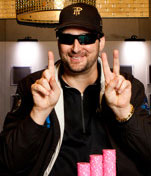
 ™
™



